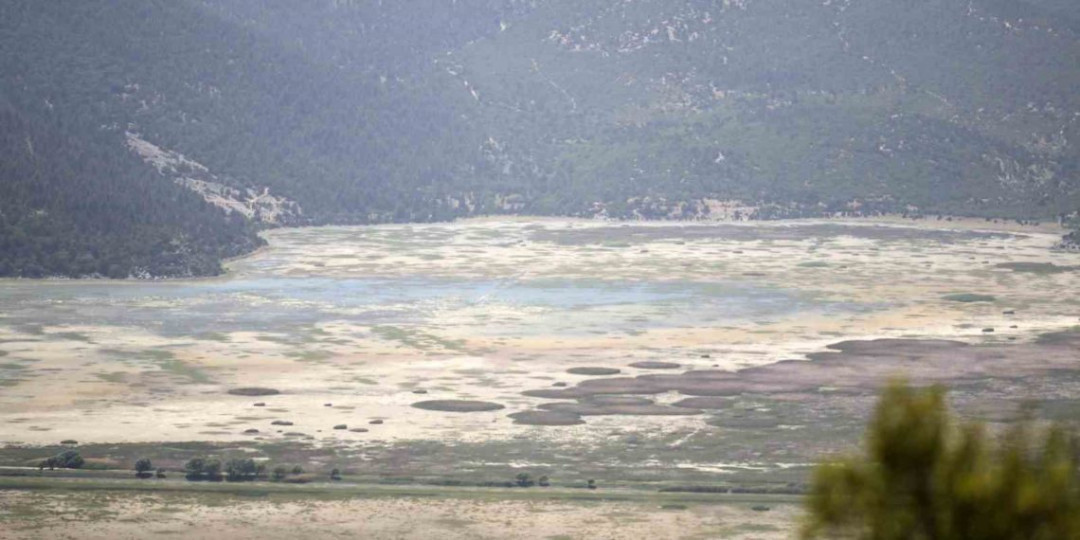Antalya's water resources are insufficient for the region! A major problem is looming

According to reports from organizations such as the United Nations (UN) and UNESCO, global and Turkish demand for water is increasing due to factors such as population growth, global warming, and drought. Meanwhile, freshwater resources are decreasing every year. The impact of drought in Antalya can be observed annually over Lake Avlan in the Elmalı district, indicating that the city's water resources are insufficient to meet the current population. Mustafa Karancı, President of the Chamber of Geological Engineers Antalya Branch, stated, "Antalya holds 9% of Turkey's water reserves, but without proper management, we are at risk of becoming a water-deficient country."
Although three-quarters of the Earth's surface is covered by water, the amount of freshwater suitable for human use is limited. Less than 1% of the world's water is available as freshwater resources suitable for ecosystems and human consumption. Approximately 35 million cubic kilometers of freshwater exist globally, with only 105,000 cubic kilometers categorized as suitable freshwater resources. By 2030, global water demand is expected to increase by around 50%, reaching up to 6,900 cubic kilometers, considering factors such as population growth, global warming, and drought. This amount represents more than 40% of the currently accessible and reliable supply.
This year will be exceptionally hot
Professor Dr. Dursun Büyüktaş from Akdeniz University noted that drought conditions in Antalya have seen precipitation levels fall significantly below the 30-year average. Büyüktaş emphasized, "Looking at the Mediterranean climate belt, we see that in the years 2005-2008-2013-2016-2017-2020-2021, rainfall was well below expected levels. Our average rainfall over approximately 30 years in the Mediterranean region is about 665,000 meters. In the mentioned years, rainfall was much lower, leading to discussions about drought. Drought is categorized into three types: meteorological, agricultural, and hydrological. Meteorological drought refers to reduced rainfall, resulting in decreased flow in streams and rivers. Agricultural drought causes reduced crop yields and agricultural production due to decreased rainfall. We have passed this stage as a country, and this year will be exceptionally hot. When looking at long-term values, rainfall has been consistently decreasing."
Greenhouses contributed to the drying of the lake
Professor Dr. Dursun Büyüktaş mentioned that Turkey previously had an annual rainfall average of 643 mm, which has now dropped to 575 mm. Büyüktaş highlighted an 11% decrease in rainfall rates due to lower precipitation, evaluating the drying conditions of Lake Avlan in Elmalı district in this context. He explained, "In the early 1970s, the waters of Lake Avlan were intentionally drained for agricultural purposes through channels managed by the State Hydraulic Works (DSİ). This was perceived as a solution to agricultural needs, but today's solution has become a problem. Therefore, such projects need to be long-term rather than short-term. Although Lake Avlan was drained, efforts have continued to restore it. There are serious ecological implications apart from human benefits; ecological life. Efforts to restore water to the lake have not been very successful. Additionally, intensive greenhouse farming, known as plateau greenhouse cultivation, began in the region."
"Let's avoid wasting water"
Professor Dr. Dursun Büyüktaş emphasized the need to use water efficiently due to global climate change causing a more severe drought in 2024 compared to previous years. Büyüktaş said, "If we want to save water, we should start with agriculture, where 75 out of 100 liters of water are used. Therefore, we need to convert our surface-irrigated lands, which currently account for 80-85%, to pressurized irrigation methods. Currently, we need to increase irrigation efficiency from the current 50% to 75-80% to maximize water use per unit. In short, let's not waste water; we need to encourage our farmers to use drip or sprinkler irrigation methods so that we can effectively use our existing water resources for future generations. Just as we used it for sustainable living, they should also use it safely."
Solution produced 50 years ago has become a problem today
President Mustafa Karancı of the Chamber of Geological Engineers Antalya Branch mentioned efforts to restore the 850-hectare Lake Avlan in Elmalı district that is drying up due to drought, noting that climate change has superseded previous projects. Karancı said, "In the early 1970s, Lake Avlan was drained by the State Hydraulic Works (DSİ) through channels for agricultural demand, leading to karstic cavities from dolines. This event was seen as a solution to agriculture but is now seen as a problem of the day. Consequently, such projects need to be long-term, not short-term. Lake Avlan was dried up, but efforts continued to recover it. We faced serious problems in that area; agricultural areas were gained, but due to changes in humidity, decreased rainfall, and drought, the desired result was not achieved."
"Seralar uses about 10 tons of water per acre"
President Mustafa Karancı drew attention to the decrease in Antalya's water resources due to drought, stating that population growth and the amount of water used in the agricultural sector are contributing to water loss. Karancı said, "Antalya's main water source comes from the Kırkgöz water resources located approximately 25 kilometers northwest of us, and we meet 99% of our drinking water needs from wells. Looking at Antalya's population, we are the fifth largest city in Turkey with a population of 2,700,000. In addition, there is an expectation of 17 million tourists, and our population and tourism have reached such serious numbers that the city's water resources cannot meet the current population. In addition, we are experiencing serious problems with agricultural areas; we established tropical greenhouses from Gazipaşa to Serik. These greenhouses consume about 10 tons of water per acre. Water is very valuable to us. Turkey holds 9% of the world's water reserves in Antalya, but we are candidates for becoming a water-deficient country if we do not manage this correctly. I believe that if we manage water correctly, we can save this city."
"There may be water cuts in Korkuteli"
President Mustafa Karancı also mentioned the risks in Korkuteli's water resources, explaining that occasional water cuts may begin in the district. Karancı said, "Our schools are closing, and the heat is starting to be felt in Antalya. Antalyans love the highlands, and the population of Korkuteli normally reaches 60,000 but rises to 400,000 in the summer. The Korkuteli basin has more than 30 provinces in terms of groundwater, and it is one of the riskiest areas for us. Therefore, we do not have enough water for our 400,000, and every year, we try to obtain drinking water through new wells, but I think there may be water cuts in Korkuteli this year. People who moved with the idea of having a garden with a garden, hobby garden will not be able to water their plants in the coming years. This requires urgent action to be taken." Nature observer Ömer Harpcı said, "For the revitalization of the Avlan Lake, the water can be found among the Sanayi District. made they the conditions are not the same to the Elmalı agricultural land in winter. realized the lands where this did.”


